Can Chickens Eat Cheese? | How To Nourish Your Backyard Flock!
Have some extra cheese lying around? Or maybe an abundant supply? We get that. Not only do we have chickens on our homestead, but there’s no shortage of cheese with our family milk cow. So let’s dig into, Can Chickens Eat Cheese?
What chickens CAN eat, and what to LIMIT or AVOID
Chickens are a wonderful addition to any backyard, homestead, or farm. Fresh eggs. Quirky, feathery friends frolicking about. But one of the best advantages chicken keepers can enjoy is a chickens ability to devour most any food scraps!
After keeping chickens for 9 years now, we’ve learned a lot about what chickens CAN eat, and what you need to LIMIT or AVOID in their diet.
As you’ll discover in this post, cheese can fall into all three of those categories.
In this video, we share a more comprehensive list of what we’ve learned that you CAN and CAN’T feed your flock.
We haven’t followed these do’s and don’ts of what to feed your chickens perfectly over the years. And thankfully we have never had any diet related issues with our chickens that we’re aware of. But it is helpful to educate yourself early as a chicken keeper to keep your chickens thriving and happy!
Can I feed my chickens cheese?
Yes. They love eating cheese! However, you want to do so in moderation. As a general rule of thumb, cheese (or dairy) should not make up more than 10% of your chicken’s diet. Too much cheese can cause unhealthy side effects – namely diarrhea and weight gain. But cheese also offers many health benefits for chickens.
We’ll get to the benefits, but first, let’s talk about why your chickens shouldn’t go overboard on cheese.
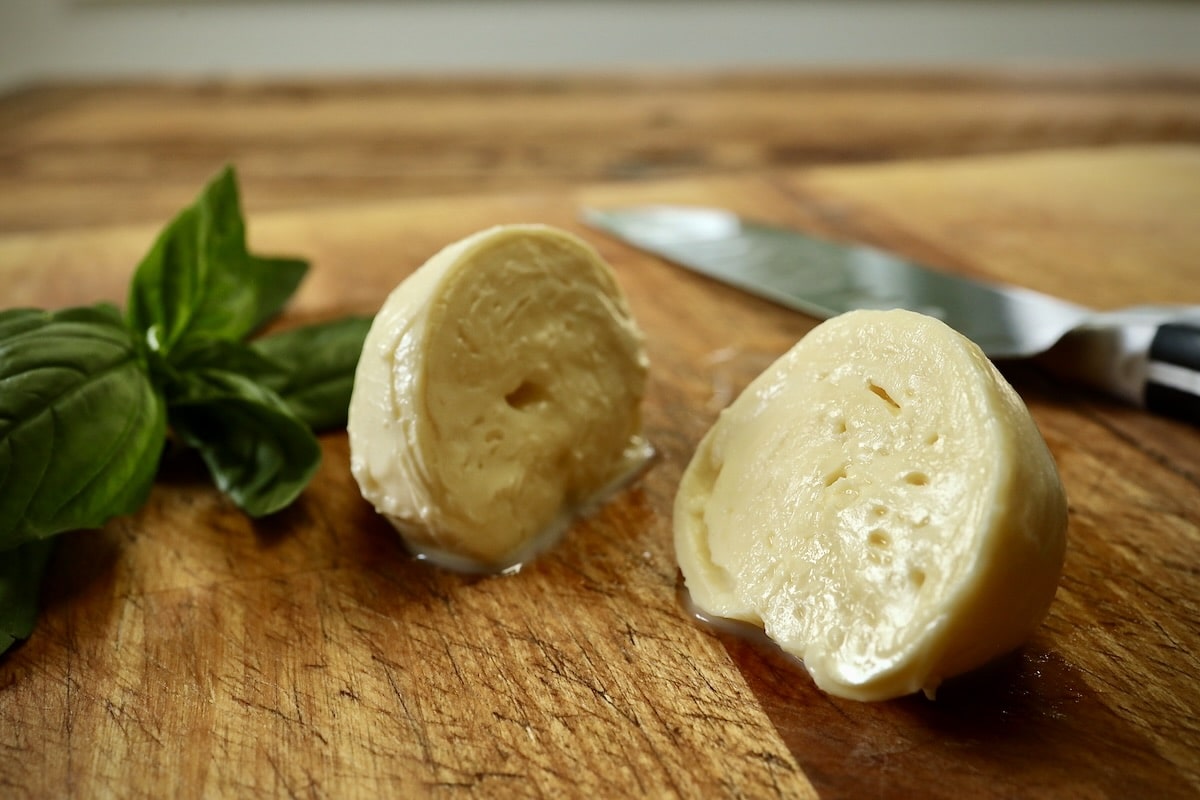
A chicken’s digestive system is not designed to handle dairy, and therefore it can be harsh on them. Too much cheese can cause diarrhea or digestive issues.
Plus, the high fat content of cheese can also cause unwanted weight gain or obesity in chickens. This presents its own set of health risks including: decreased fertility, oversized eggs, egg-binding, prolapsed vent, liver issues, and can put them at risk of heat stroke.
So, when introducing cheese to your chickens, it’s best to not go crazy. Introduce it gradually and observe how they respond. Just like with humans, you want your chickens to have a well-balanced diet of healthful foods.
As we’ll see, cheese can easily fit that bill.
Is cheese beneficial for chickens?
Cheese contains many healthy proteins, fats, and nutrients. Here are some of the benefits your flock can enjoy when given cheese in moderation:
Great Protein Source
Cheese is packed with protein; specifically the casein protein. This slow-digesting dairy protein is a complete protein source meaning it contains all the essential amino acids needed for muscle growth and repair. Many systems of the body depend on protein. In chickens, protein contributes to proper fluid levels, a healthy immune system, and feather growth.
Healthy Fats
While you want to avoid too much weight gain, making sure your gals keep a healthy weight is critical. Egg production requires an incredible amount of energy. Chickens below their optimal weight will struggle to keep up with those demands. A healthy form of fat called Conjugated Linolic Acid (CLA) is commonly found in cheeses and is known to prevent obesity and heart disease and can aid in reducing inflammation.
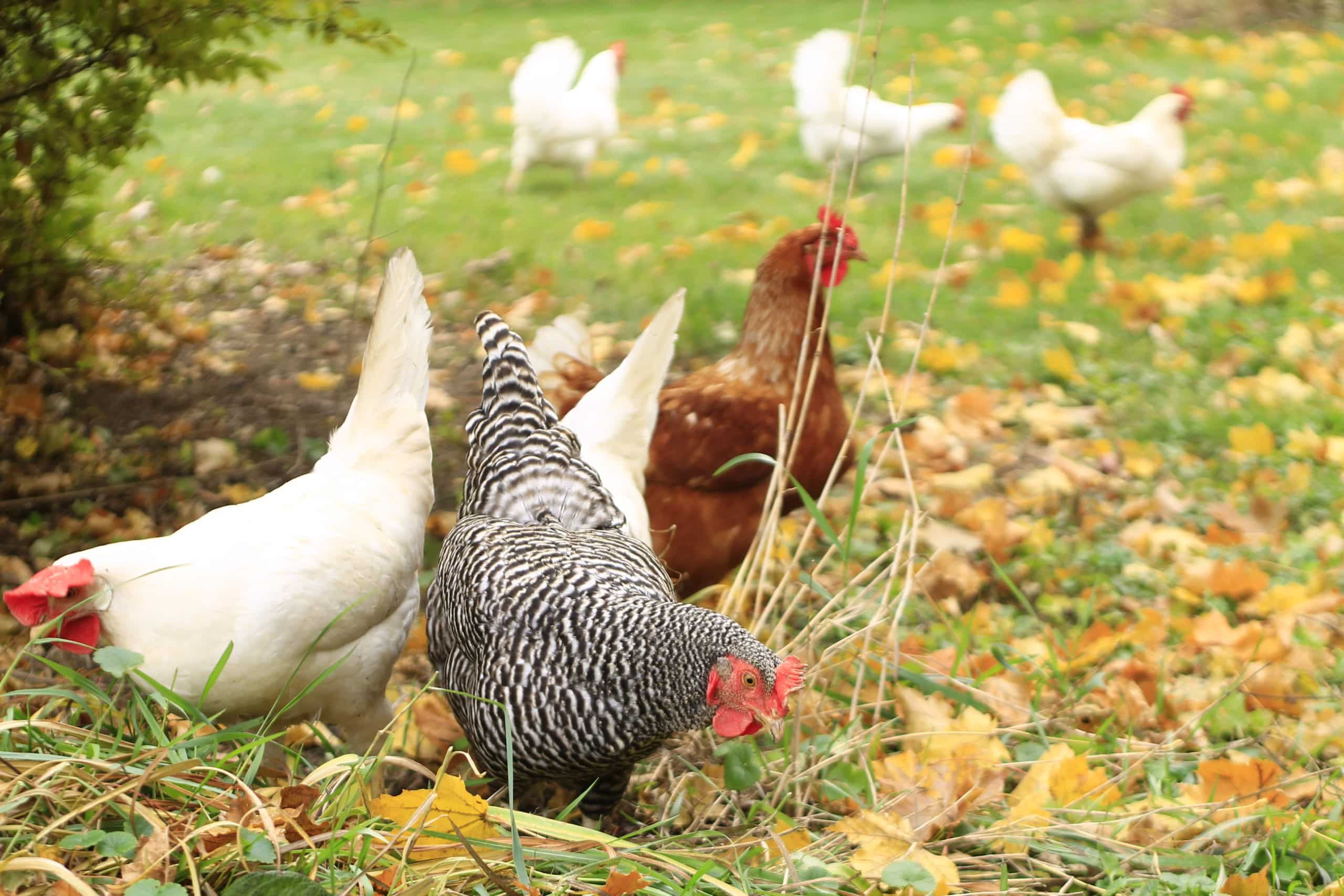
High in Calcium
Calcium plays a critical role in egg production for chickens. However, their bodies do not produce it on their own. So, calcium needs to be supplemented in their diet. If you’re noticing soft or thin egg shells, it likely means a calcium deficiency. Cheese is a fantastic source of calcium. Aside from supplementing with oyster shells or dried and crushed egg shells, cheese may be the best source of natural calcium you can provide for your chickens.
Immune Support
The backbone of the body’s immune system lies in the gut. Proper digestion through probiotic support in the gut helps your body absorb nutrients and fight off sickness and disease. Many cheeses are fortified with probiotic bacteria. Gouda, cheddar, and parmesan are a few examples of cheeses packed with healthy gut bacteria.
Bone Health & Egg Production
Without proper nutritional support, birds can have fragile bone structures. Especially as they age. Many of the vitamins and minerals that promote bone health are also crucial in egg production within chickens. Cheese contains a robust amount of vitamins and minerals that are essential for chickens. The list includes calcium, vitamins B12, A, K2, selenium, sodium, phosphorus, zinc, and riboflavin.
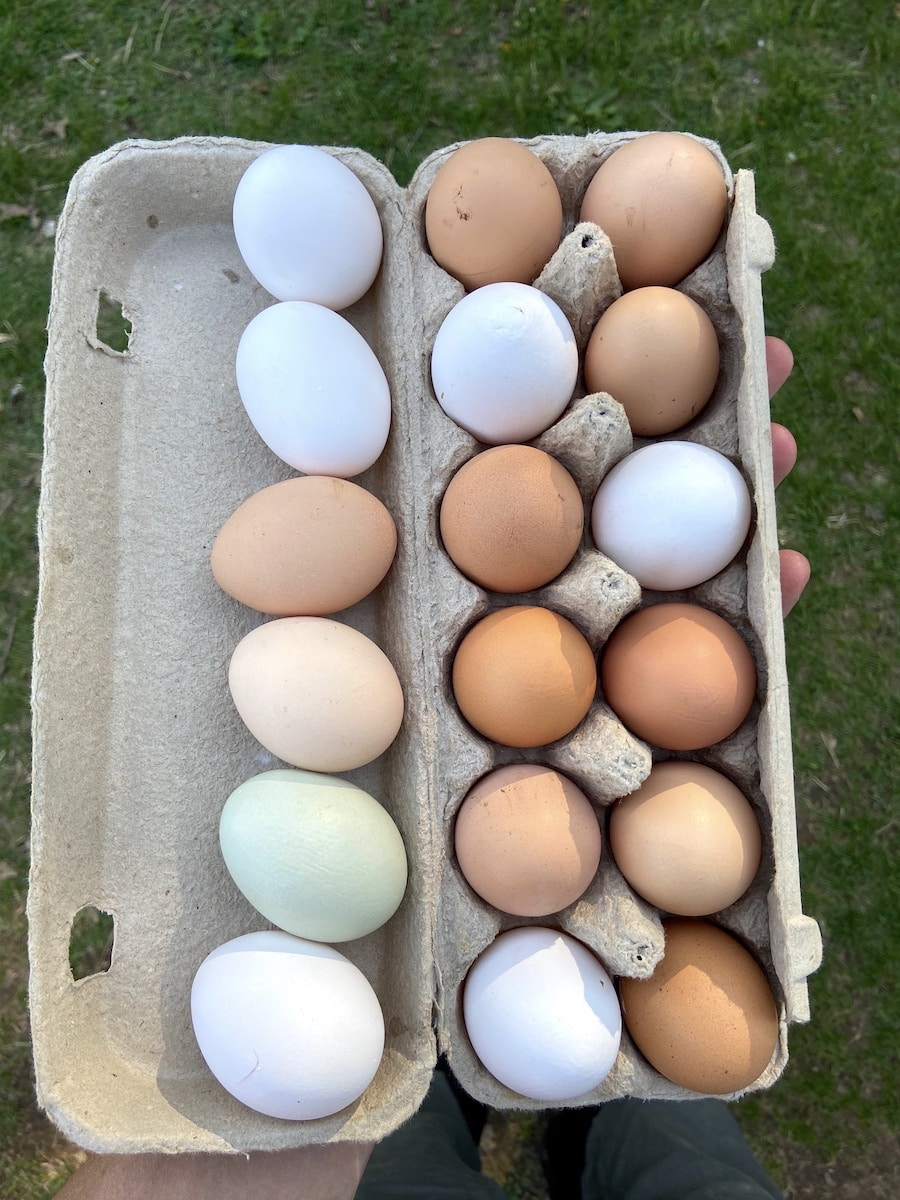
Can chickens eat ALL types of cheese?
The short answer is, Yes. However, not all cheeses are created equal or offer the same levels of nutrients for your chickens. And there are MANY types of cheeses. So which should you avoid and which are best?
Types of cheeses chickens should AVOID:
- American cheese single slices
- Cheese spreads
- Cheese sticks
- Ricotta*
- Any highly processed cheeses
These cheeses to avoid are typically highly processed and offer very little nutritive value. They’re also likely to contain unhealthy or synthetic additives that will not benefit your chickens. We like to view our chickens diet like we would our own; if it’s not something we’d feed our own family we shouldn’t give it to our chickens! So it’s best to just avoid these cheese-like substitutes all around.
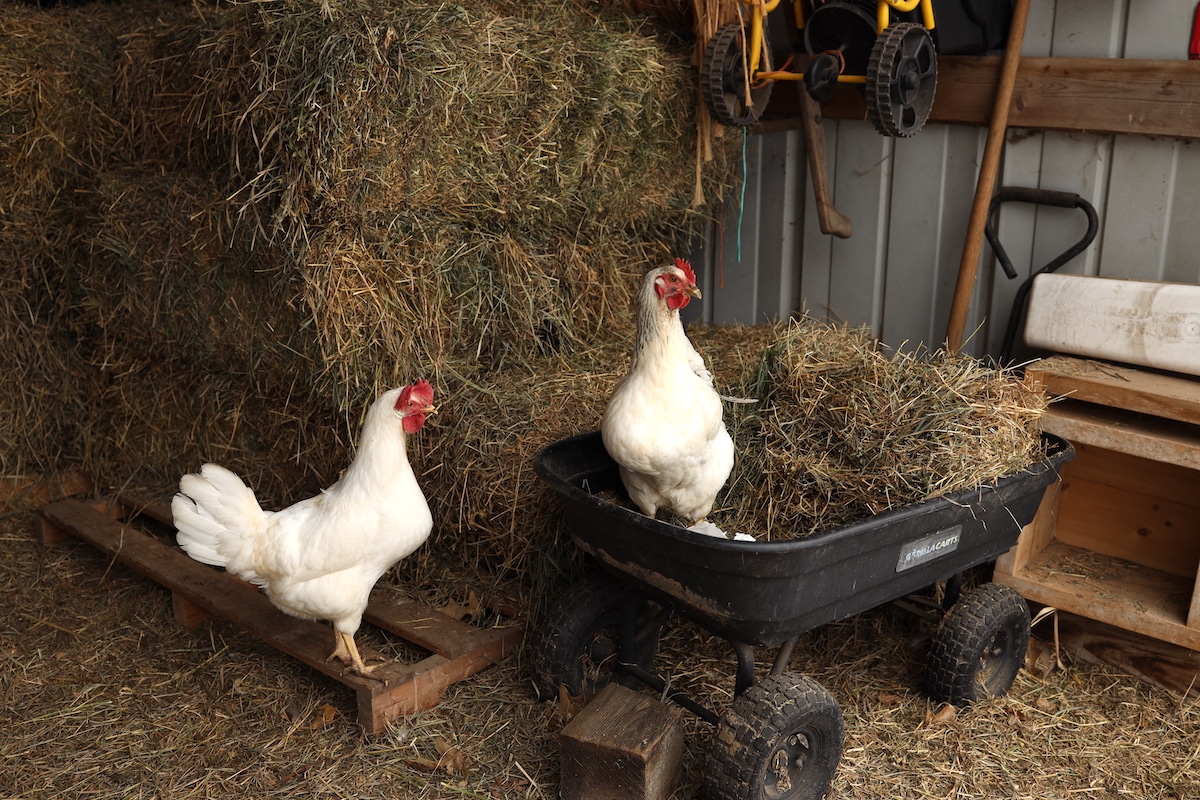
If you’ve accidentally given chicken cheeses from this list, they’ll most likely be just fine! The point of this list is to avoid giving your chickens these cheeses as a regular or supplemental part of their diet.
*Ricotta can be a very healthful food option when made properly. But because it’s commonly made from whey (more on whey below) there’s less nutritional value for your chickens to gain than other forms of cheese.
Types of cheeses that chickens CAN eat:
- Goat cheese
- Cream cheese
- Shredded or sliced cheese
- Mozzarella cheese
- Gouda cheese
- Brie cheese
- Cottage cheese
- Cheddar cheese
- Blue (Moldy) cheese
- Parmesan cheese (see below)
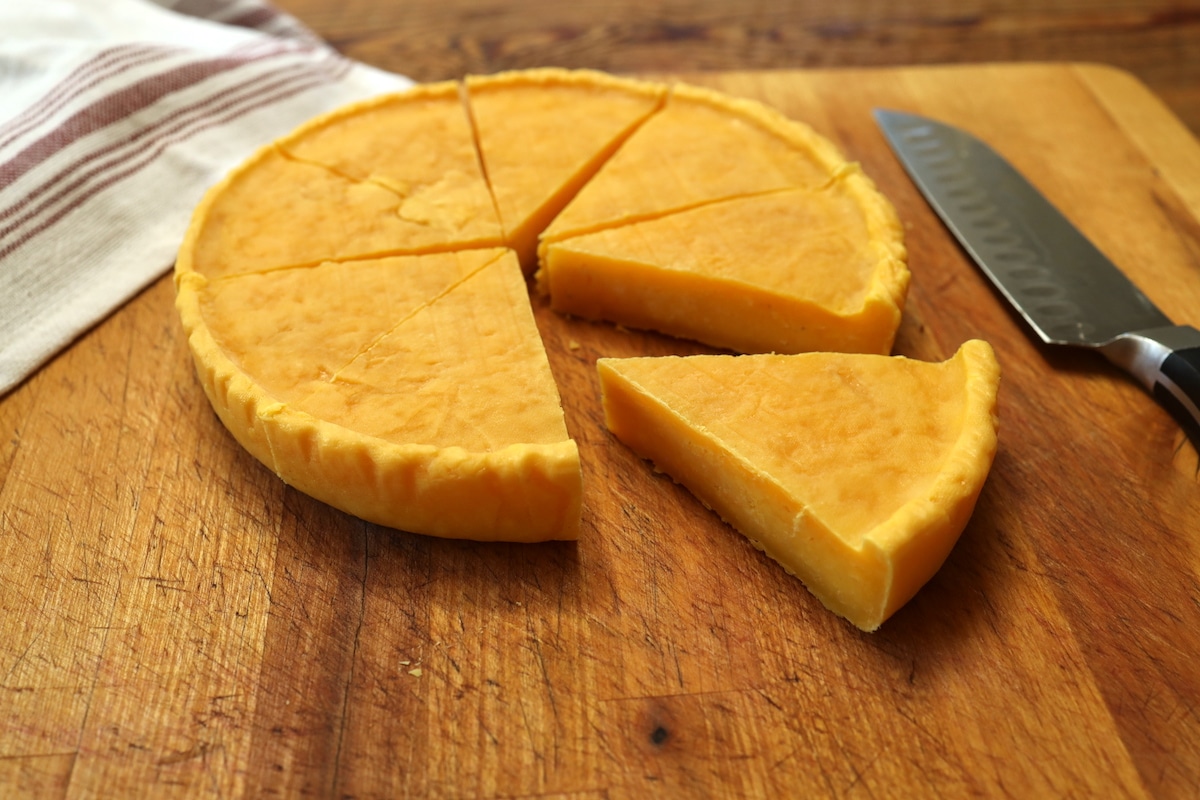
Atop this list sits goat cheese, which contains less lactose than cheese from cows milk making it easier to digest. In general, an aged cheese will also contain less lactose making it more digestible.
Extremely hard cheeses, like parmesan, will be near impossible for a chicken to consume in its block state. However, parmesan can still be a very healthful cheese option for your chickens when grated to a very fine texture.
Soft cheeses are easiest for your chickens to consume. Chickens can most likely handle a soft cheese in its whole form, but it can also be cut, sliced, or shredded.
Anything in the hard cheese category, like cheddar, should be sliced thin or shredded.
Moldy cheeses, like blue cheese, are often cultured with penicillium roqueforti and can offer an extra boost of beneficial bacteria that strengthens the immune system through antibacterial properties.
If desired, cheese can also be mixed in with a chickens feed for a supplemental source of protein, fat, calcium, and other vitamins and minerals.
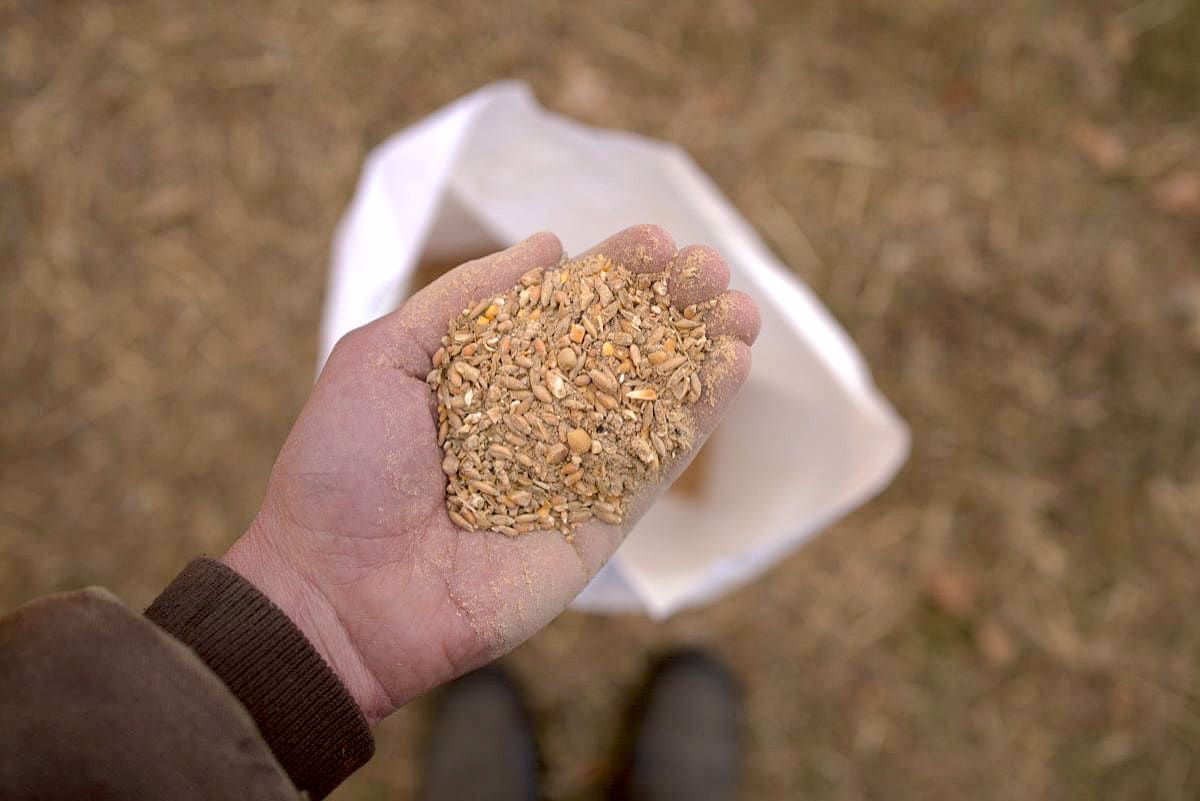
Is DAIRY safe for chickens?
Going beyond cheese, dairy can include foods like yogurt, kefir, butter, ghee, sour cream, buttermilk, and milk.
Like cheese, your chickens will likely love these dairy treats! But, you still want to offer them in moderation. Especially higher fat options like butter or sour cream.
Keep close watch of their digestive habits along with other normal functions like egg laying to make sure they’re staying healthy.
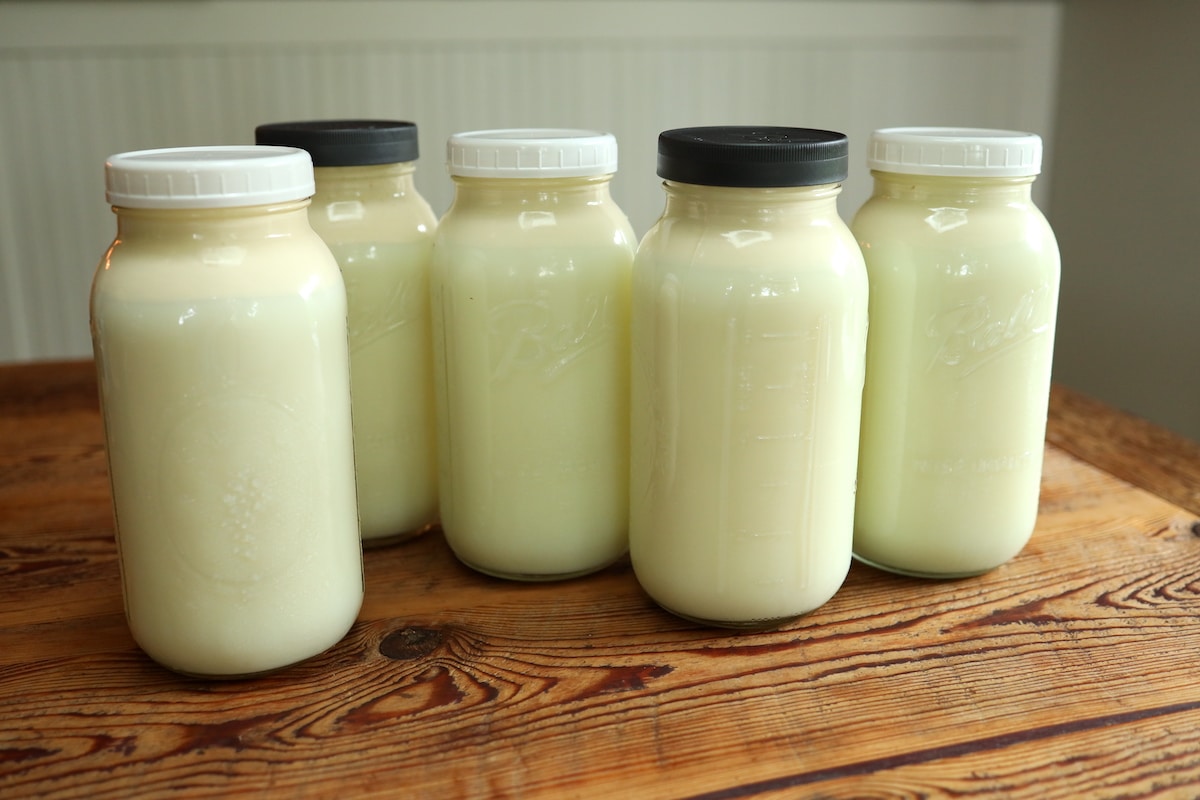
Any dairy with added sugars or other ingredients, such as chocolate, should not be given to chickens. This would include items like ice cream and cheesecake.
Cheese will typically be a healthier option for your chickens than other dairy products due its solid form. The fourth stomach of a baby ruminant, such as a calf, lamb, or kid, produces an enzyme that coagulates milk, turning it from its liquid form (milk) to its solid form (curd) which becomes the starting point of most cheeses. The young animal is then able to digest and absorb the nutrients from milk easier when in a solid state. Cheesemaking mimics this process also providing those solid form benefits that make nutrients more bioavailable.
Can chickens eat WHEY?
The other byproduct of cheesemaking is whey. Most cheeses begin by separating milk into the curd and the whey. Curd is a solid. Whey is a liquid.
While the curd maintains the bulk of the nutritive value within milk, including all of the casein protein content, whey can still provide a substantial amount of nutrition for humans and animals alike—chickens included.
Unlike casein, whey protein digests rapidly making it an ideal source for quick protein while also offering minerals such as potassium, calcium, phosphorus, and zinc.
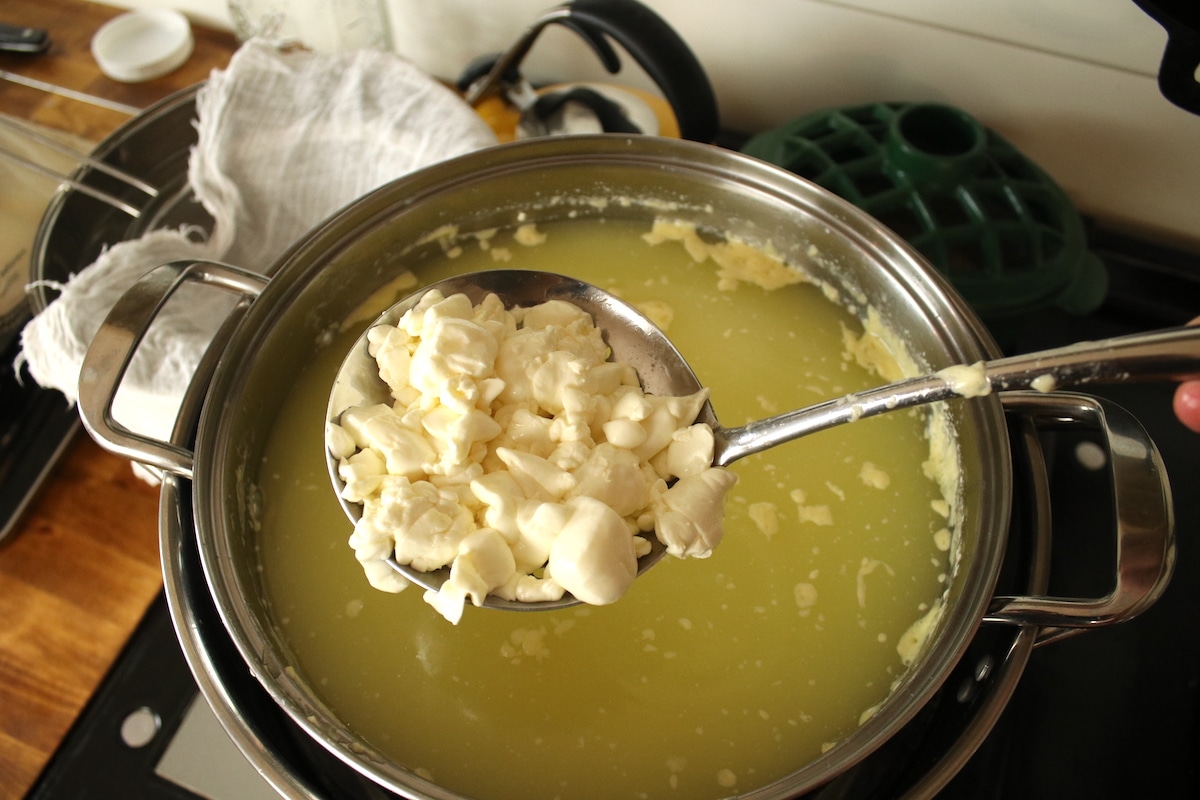
We often have whey leftover from making cheese and feed it to our chickens in a bowl. Some of our chickens have gone crazy over it while others never quite warmed up to it.
Another way to benefit from the nutritional value whey offers is to soak your chickens feed in it prior to serving. This will allow the feed to absorb the extra protein and minerals from your feed while also making the grains in your feed more digestible for your ladies.
Can chickens eat cheese RINDS?
Many cheese rinds form as a natural part of the cheesemaking process and are therefore fine for a chicken to eat. Again, the rind might be tough or hard, so shredding them might help your chickens eat a natural cheese rind more easily.
Other cheese coatings can include wax, cloth, or plastic. These materials are inedible and therefore should not be fed to chickens.
Can chickens eat cheesy treats?
Cheesy treats might be things like: cheese puffs, cheese popcorn, cheese crackers, cheese balls, cheese pizza, cheese sticks, or cheese curds.
While a chicken can likely eat these items and be fine, we recommend you avoid giving them to your chickens. These foods fall into the highly processed food category and will provide your chickens with little nutrition, unhealthy fats, and other synthetic food additives.
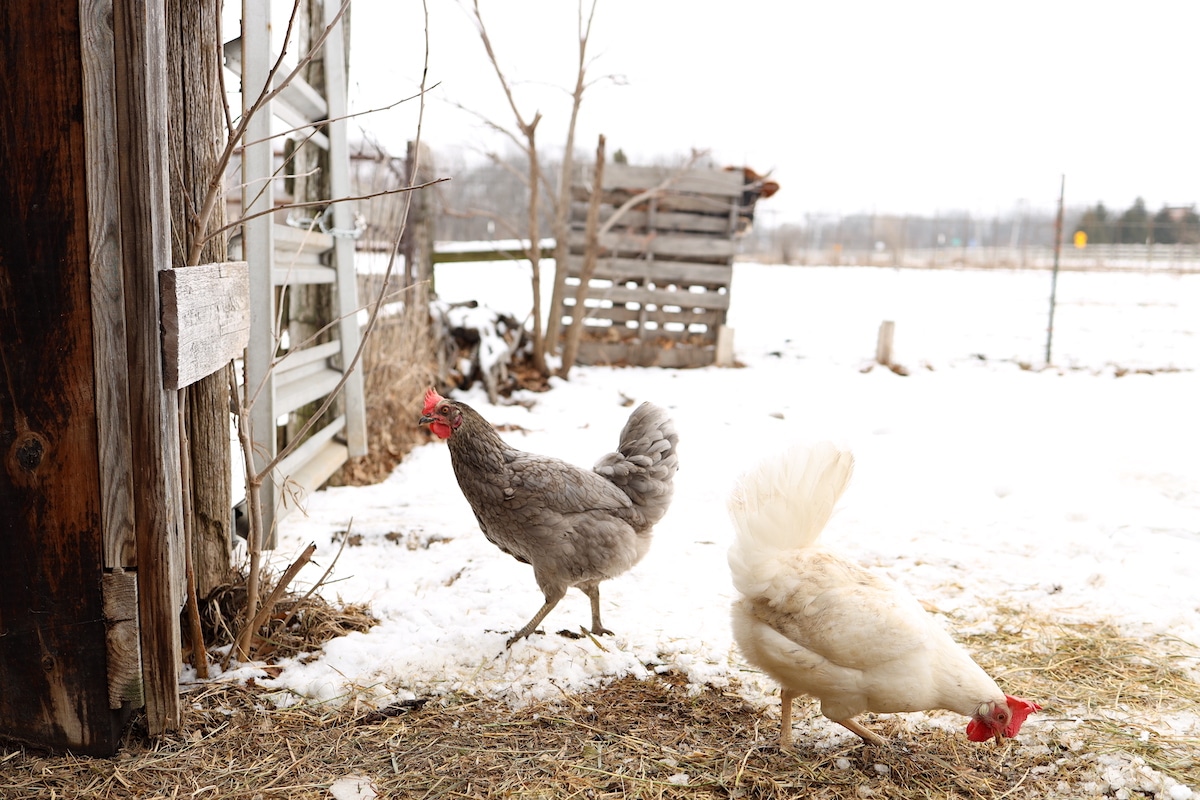
In general, we view our chickens diet like we would our own and try to offer them whole, nutrient-dense foods. If you’re unsure if something is suitable for your chickens to consume, toss it the compost pile to keep it away from them and avoid any negative health impacts.
Our Simple Chicken Food Scrap System
Giving chickens your food scraps is a great way to use them productively and avoid sending them to the landfill!
To do this, we’ve developed a simple system with two compost pales that sit on our countertop. One is designated for compost food scraps that we don’t want the chickens to have. The other is designated to go out to the chickens for their consumption.
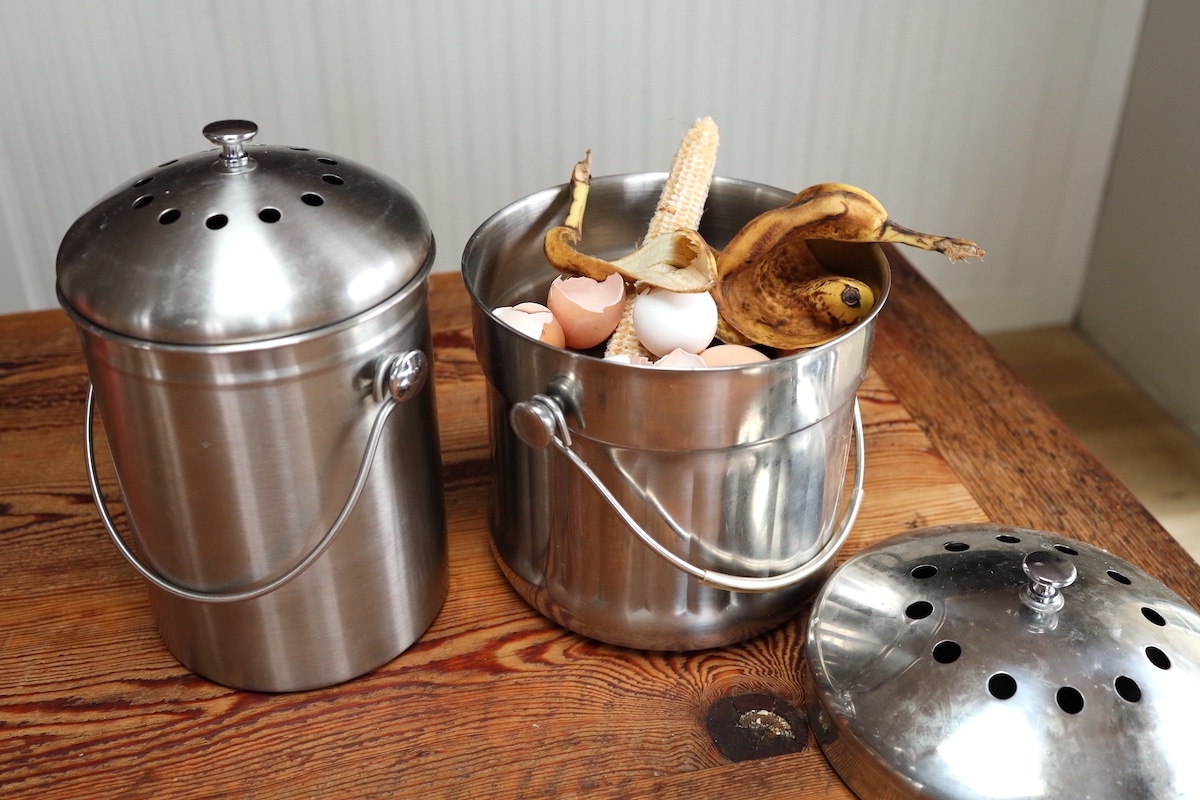
Again, if you’re interested in learning more, check out this video about what we do or don’t feed our chickens!
Whatever system you have for giving food scraps to your feathery flock, we hope you better understand the benefits and risks that cheese can play in their diet.
Happy hen raising!
Some of the above links are affiliate links. This means we earn a small commission on qualifying purchases at no cost to you. We are so appreciative of your support!
Looking for more chicken how-to’s? Check out these posts:
- Chicken Tractor Plans for 25 Chickens
- Chicken Roost Designs | Two Simple DIY Ladder Perch Ideas
- How To Care For Chickens In The Winter Basics
- Simple DIY Chicken Coop Inside Your Barn
- How To Care For Baby Chicks
- Simple Outdoor Chicken Brooder Ideas
Pin it for later!

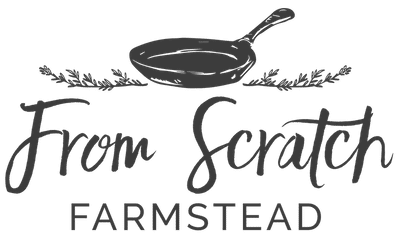
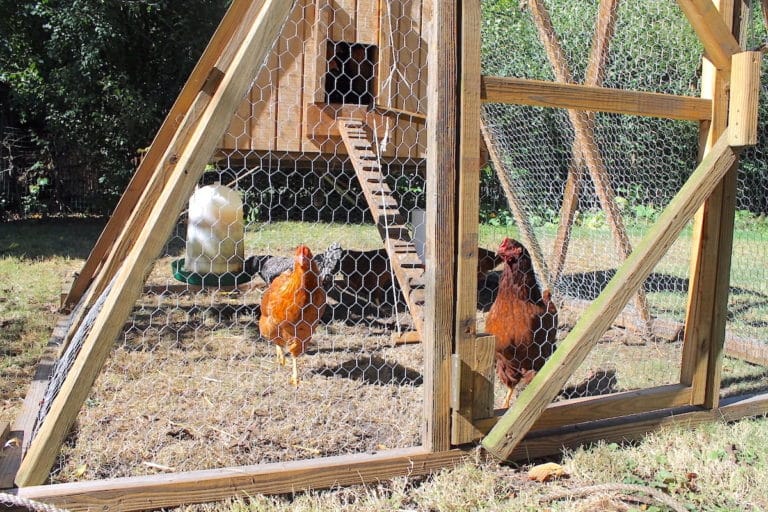
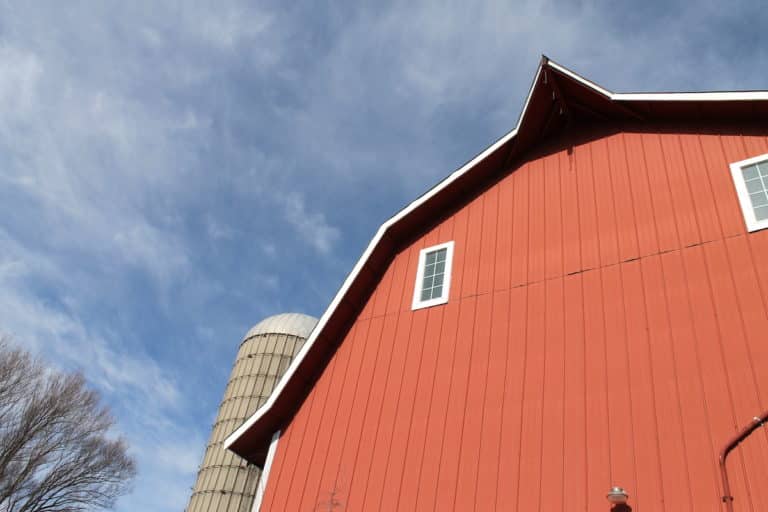

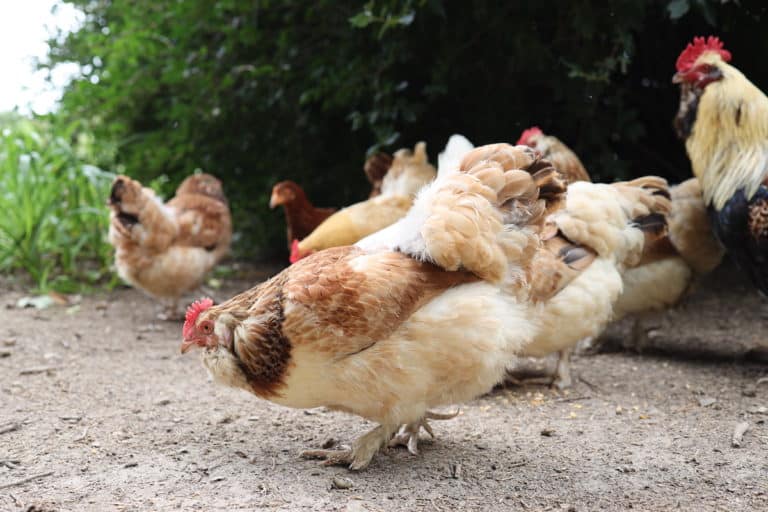

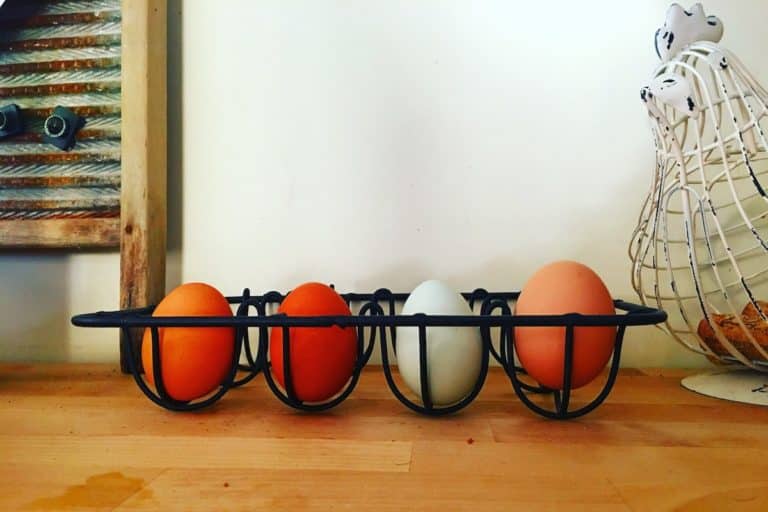
Where did you get your compost bins from? We have been using a 3 gallon bucket and I am thinking using the smaller bins would be better for the space we have in the kitchen because I never fill the 3 gallon bucket.
Good question! We meant to link the one that we have but forgot. I just updated the post with the link but it was just from Amazon – https://amzn.to/3kJhioe. We have appreciated having the smaller countertop one with the lid!